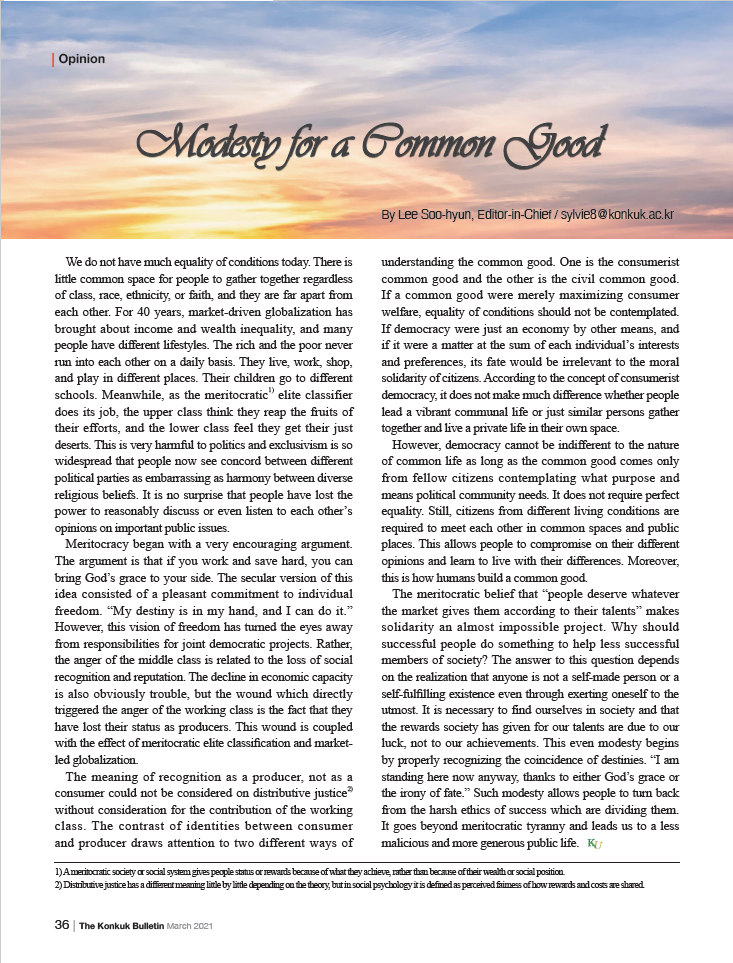
We do not have much equality of conditions today. There is little common space for people to gather together regardless of class, race, ethnicity, or faith, and they are far apart from each other. For 40 years, market-driven globalization has brought about income and wealth inequality, and many people have different lifestyles. The rich and the poor never run into each other on a daily basis. They live, work, shop, and play in different places. Their children go to different schools. Meanwhile, as the meritocratic1) elite classifier does its job, the upper class think they reap the fruits of their efforts, and the lower class feel they get their just deserts. This is very harmful to politics and exclusivism is so widespread that people now see concord between different political parties as embarrassing as harmony between diverse religious beliefs. It is no surprise that people have lost the power to reasonably discuss or even listen to each otherʼs opinions on important public issues.
Meritocracy began with a very encouraging argument. The argument is that if you work and save hard, you can bring God’s grace to your side. The secular version of this idea consisted of a pleasant commitment to individual freedom. “My destiny is in my hand, and I can do it.” However, this vision of freedom has turned the eyes away from responsibilities for joint democratic projects. Rather, the anger of the middle class is related to the loss of social recognition and reputation. The decline in economic capacity is also obviously trouble, but the wound which directly triggered the anger of the working class is the fact that they have lost their status as producers. This wound is coupled with the effect of meritocratic elite classification and marketled globalization.
The meaning of recognition as a producer, not as a consumer could not be considered on distributive justice2) without consideration for the contribution of the working class. The contrast of identities between consumer and producer draws attention to two different ways of understanding the common good. One is the consumerist common good and the other is the civil common good. If a common good were merely maximizing consumer welfare, equality of conditions should not be contemplated. If democracy were just an economy by other means, and if it were a matter at the sum of each individualʼs interests and preferences, its fate would be irrelevant to the moral solidarity of citizens. According to the concept of consumerist democracy, it does not make much difference whether people lead a vibrant communal life or just similar persons gather together and live a private life in their own space.
However, democracy cannot be indifferent to the nature of common life as long as the common good comes only from fellow citizens contemplating what purpose and means political community needs. It does not require perfect equality. Still, citizens from different living conditions are required to meet each other in common spaces and public places. This allows people to compromise on their different opinions and learn to live with their differences. Moreover, this is how humans build a common good.
The meritocratic belief that “people deserve whatever the market gives them according to their talents” makes solidarity an almost impossible project. Why should
successful people do something to help less successful members of society? The answer to this question depends on the realization that anyone is not a self-made person or a self-fulfilling existence even through exerting oneself to the utmost. It is necessary to find ourselves in society and that the rewards society has given for our talents are due to our luck, not to our achievements. This even modesty begins by properly recognizing the coincidence of destinies. “I am standing here now anyway, thanks to either God’s grace or the irony of fate.” Such modesty allows people to turn back from the harsh ethics of success which are dividing them. It goes beyond meritocratic tyranny and leads us to a less malicious and more generous public life.
1) A meritocratic society or social system gives people status or rewards because of what they achieve, rather than because of their wealth or social position.
2) Distributive justice has a different meaning little by little depending on the theory, but in social psychology it is defined as perceived fairness of how rewards and costs are shared.

